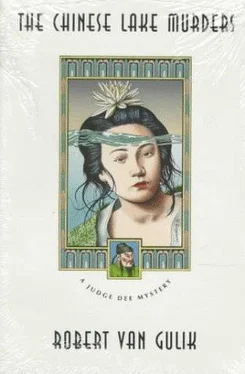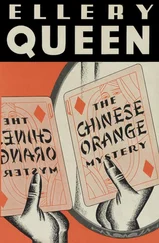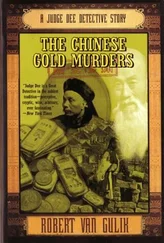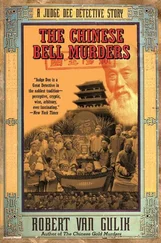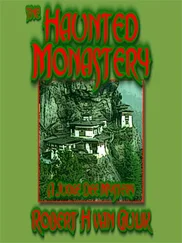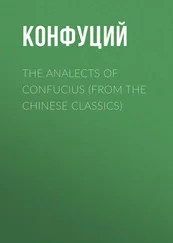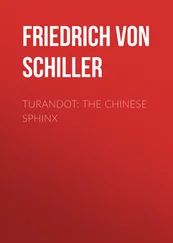The court was a spacious hall, completely bare except for a few inscriptions suspended on the wall, extolling the majesty of the law. At the back of the hall was the dais, with the bench. Behind the bench stood a large armchair, occupied by the magistrate when the court was in session. To the left and right of the bench stood lower tables, where the scribes sat and noted down all the proceedings. Behind the bench, a doorway gave entrance to the private office of the magistrate-the judge's chambers, as we would say. This doorway was covered by a screen bearing a large image of the unicorn, the ancient Chinese symbol of perspicacity. In his private office the magistrate conducted all routine business when the court was not in session. There were as a rule three sessions every day, one early in the morning, one at noon and one late in the afternoon or in the early evening. Sundays did not exist: the only official holiday was New Year's Day.
The private office looked out on a second courtyard, around which were built a number of smaller offices where the clerks, the archivists, the copyists and the other personnel of the tribunal and the district administration did their work. Behind the chancery there was a garden with, at the back of it, the large reception hall, used for various public occasions and for receiving important visitors.
Finally, the compound contained the living quarters of the magistrate, where dwelt his wives, his children, and his own servants. These private quarters formed a small compound in themselves.
As to the methods followed by an ancient judge in solving crimes, he was naturally handicapped by the lack of all the aids developed by modern science. For him there were no fingerprint system, no chemical tests, no photographic experiments. On the other hand, his work was facilitated by the wide powers granted him under the provisions of the Penal Code. He could have anyone arrested on the mere issuing of a warrant; he could put the question to suspects under torture, have recalcitrant witnesses beaten up on the spot, use hearsay evidence, bully a defendant into telling a lie, and then trip him up with relish-in short, he could openly and officially use all kinds of third and fourth degrees which would make our judges shiver in their gowns. It must be added, however, that it was not by torture or other violent means that the ancient Chinese judges achieved their successes, but rather by their wide knowledge of their fellow men, their logical thinking and, above all, by their sound common sense. Chinese magistrates like Judge Dee were men of great moral strength and intellectual power, and at the same time refined literati, by their education thoroughly conversant with Chinese arts and letters. While their classical education had given them a comprehensive knowledge of human affairs, including a smattering of medicine and pharmacology, the detailed Buddhist speculations on the analysis of human emotions and the working of the mind, at an early date introduced into China from India, had given Chinese scholars shrewd psychological insight. Therefore Judge Dee's analysis of Liu Fei-po's abnormal love life as described in the present novel is not as anachronistic as it would seem at first sight.
Abuse of judicial authority was checked by several controlling factors. In the first place, the district magistrate was but a small cog in the colossal Imperial administrative machinery. Fie had to report his every action to his immediate superiors, accompanied by all pertaining original documents. Since every official, high or low, was held completely responsible for the actions of his subordinates, these data were carefully checked on several administrative levels, and if there was any doubt, a retrial was ordered. If a mistake was found there followed severe disciplinary action against the responsible magistrate. The magistrate's position of well-nigh absolute power and complete superiority over all persons brought before his bench was but borrowed glory, based not on his personal rank but solely derived from the prestige of the system he was temporarily appointed to represent. The law was inviolable, but not the judge who enacted it. No judicial official could ever claim for himself immunity or any other privilege on the basis of his office. As soon as a higher authority found fault with a judge, he was summarily divested of all his power, and immediately reduced to the sorry state of "prisoner" before the bench, kneeling on the bare floor and beaten and insulted by the constables-until he had justified his conduct. In this novel I tried to illustrate this point.
It does credit to the democratic spirit that has always characterized the Chinese people, despite the autocratic form of their ancient government, that the most powerful check on abuse of judicial authority was public opinion. The L ü-hsing , a document dating from before the beginning of our era, states that "judges should act in concert with public opinion." All sessions of the tribunal were open to the public and the entire town was aware of and discussed the proceedings. Thus all hearings of a case, also those of the preliminary investigation, were carried out in public; in this respect the old Chinese system was even ahead of our own. The teeming masses of the Chinese people were highly organized amongst themselves, and could make their voice heard. Next to such closely knit units as the family and the clan, there were the broader organizations of the professional guilds, the trade associations and the religious brotherhoods. If the populace chose to sabotage the administration of a cruel or arbitrary judge, taxes would not be paid on time, the registration would become hopelessly tangled, and public works would fall into disrepair. And soon an Imperial Censor would appear on the scene and institute an investigation. These dreaded Censors traveled strictly incognito all over the Empire, vested with absolute powers, and responsible only to the Throne. They were empowered to have any official summarily arrested and conveyed to the capital for trial.
The greatest defect of the system as a whole was that in the pyramidal structure too much depended on the top. When the standard of the metropolitan officials deteriorated, the decay quickly spread downward. The general deterioration of the administration of justice became conspicuous during the last century of Manchu rule in China. One need not wonder, therefore, that foreign visitors who observed affairs in China during the nineteenth century did not comment very favorably on the Chinese judicial system.
A second defect was that the system assigned far too many duties to the district magistrate. He was a permanently overworked official. If he did not devote practically all his waking hours to his work, he was forced to leave a considerable part of his duties to his subordinates. Men like Judge Dee could cope with their heavy task, but it can be imagined that lesser men would soon become wholly dependent on the permanent officers of their tribunal, such as the senior scribe, the headman of the constables, etc. And these small fry were particularly prone to abuse their power.
It may be added that the function of district magistrate was the steppingstone to higher office. Since promotion was based solely on actual performance, and since the term of office rarely exceeded three years or so, even mediocre persons did their utmost to be satisfactory father-and-mother officials, hoping in due course to be promoted to an easier post.
All in all the system worked well. The following statement by Sir George Staunton, the capable translator of the Chinese Penal Code, may be quoted here as a tribute to the ancient Chinese judicial system, all the more so since he wrote at the end of the eighteenth century, when the central authority of the Manchu conquerors was already disintegrating and when consequently many abuses of judicial power had set in. "There are substantial grounds for believing," this cautious observer says, "that neither flagrant, nor repeated acts of injustice do, in point of fact, often, in any rank or station, ultimately escape with impunity."
Читать дальше
